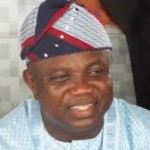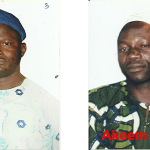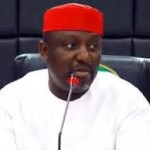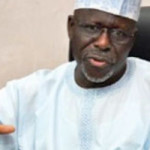OPINION: Nigeria is Seemingly Losing the War on Democracy
Articles/Opinion, Featured Contributors/Columnists, Latest Headlines Tuesday, May 23rd, 2017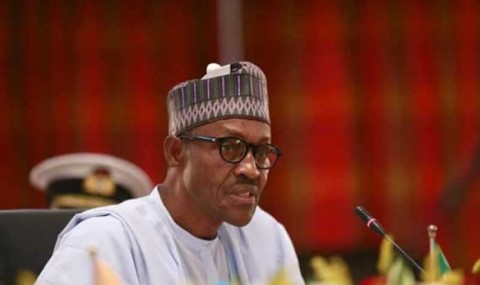
Photo caption: Nigeria’s president Muhammadu Buhari
By Prof R. A. Ipinyomi, University of Ilorin, Nigeria
(AFRICAN EXAMINER) – The Nigeria War on Democracy has a long history into the colonial era. The aim of successive generations of enlightened Nigerians has been to find and install genuine indigenous leadership to fast track the “Socioeconomic Development of Nigeria Society”. Part of their aspiration is also attempt to build an egalitarian society where justice, peace and unity may reign. Unfortunately Nigeria is witnessing higher social unrests and insurgencies in the form of Boko Harm activities, kidnappings, regional agitations, low payment and unpaid salaries by state and local government authorities. Meanwhile the level of socioeconomic inequalities in Nigeria society is growing exponentially intolerable and can cause its own class of insecurity. Only insensitive politicians and community organizers would ignore the plights caused by non-salary payments and subsequent agonies of the people. Democracy principle was designed to midwife between its people and their social welfare, and to pilot the human and resource management. It was never designed as a source of wealth gathering for political office holders but Service Avenue to the community.
What we call Nigeria today may be different from region to region but the common goal has been consistent. Nigerians have been exploring the prevailing and past constitutional framework and type of government that would lead to the achievement of their objectives. The unfortunate factors militating against unifying national focus are not only the historical divide-and-rule colonial heritage but the prevailing unwholesome regional agitations and the group of individuals hijacking apparatus of governance. The military interventions in the (1966, 1979) & (1983, 199), and the attempts of various military men to convert self to civilian politicians, without adequate training, form a major obstacle. It is not unlikely that, politicians with military backgrounds, under whose supervision the various constitutions were written, have failed the nation by equating personal or regional interests to national interests in their youthful exuberance and remotely controlled by the old cabal. There have been too many failures on the part of every successive Nigerian leadership to the extent that national goals have been grossly compromised.
The latest compromise is not the fact that the current Nigeria President Buhari’s known illness and weakness but the collective failure of the politicians and their inability to be truthful to the Nigeria constitution above emotion and individual interest. According to the Nigeria military leader we are also being informed of politicians, acting as agents and taking part in secret campaigns against Nigeria democracy. Even whilst the claim is unconfirmed and uninvestigated and could be only a false alarm, the public is no doubt seeing similar scenarios with past politicians colluding with military brass for government change. The aborted presidential election of 1992, where late Chief M. K.O. Abiola was the presumed winner, had the symptom of “civilians colluding with military for government change” but backfired on the civilians.
Now the democratic process that started with Gen Olusegun Obasanjo in 1999 and which effectively ended the last leg of 16 consecutive years of military rule is now for examination. Should the sequence of leadership have been Olusegun, Yar Adua, Jonathan, and now Buhari in that order, and given the history of democratic struggle in Nigeria? What have these people contributed to democratic struggle in Nigeria individually and severally? If this sequence was wrong the entire result would be wrong. That Gen Obasanjo became the third elected head of government since Nigeria independence of 1960 is another story unwritten. Similarly that Gen Buhari had been a military head of Nigeria government from a coup (December 31 1883 to June 1985) and now the same Buhari is the current elected President, also reveals a lot of information on democracy in Nigeria.
This outcome is not what most electorates believed they had struggled for. Rather Nigerians are looking forward with great anticipation for “a government of the people by the people and for the people”, and such that will bring them widespread jubilation and an era of stability, peace, and economic prosperity. The present settings seemingly are coming from the dictates of some cabal and individuals calling selves “political godfathers”; a group of people without any commitment to combating any of the ills that are currently plaguing the country. These are politicians with only intentions but no deeds or characters to follow through on any agenda, they are only orators and claiming to be able to “bridge the cleavages between ethnic and religious groups, and to guide the country through the process of democratization” but they are actually obstacles to democracy. During the military era, the general public expectation was the return of Nigeria to democratic governance and a process that would lead to socioeconomic growth and the restoration of freedoms lost under the regimes. Alas, it has been one disappointment after another.
The principles of democracy have been re-written by pseudo Nigerian politicians to mean zoning, preferred choices of the cabal, regional preferences, candidates from religious combinations, and the like. Whereas in December 2002 not fewer than 40 Nigerians and other experts on the country attended a conference at the Kennedy School at Harvard, to deliberate on Nigeria’s problems. The conference participants identified and suggested possible resolutions to Nigeria’s nine critical governance problems, namely, over-centralization, lack of transparency, lack of economic diversification, corruption, Sharia imposition (Islamic law), lack of human security, human rights, a national conference to debate constitutional reform, and leadership. Nigeria is not absent in conferences and coming home with notes but successive Nigerian governments have been “failing in believing and implementation” of outcomes of conferences and research deliberations.
The current political jam-lock confronting Nigerian pro-democracy and human rights activists has now been confounded because everyone would believe that Nigeria has been running a democratic system since 1999. In fact May 29 of every year has been selected by the political class and celebrated as “Nigeria Democracy Day”. The number of political parties is many but only dominant one-party system each time. Whereas when a military junta is ruling it is easy for the groups to match out against such a junta it would now be very difficult asking for the installment of democracy because elected or selected officials are in office. To correct a wrongly installed system may be more difficult than reinstalling a new one from the start. The pro-democracy groups need to expose the ongoing governance system for what it is. They need to tell the entire world that Nigerian politicians cannot read or interpret their own constitution. They cannot practice their own constitution. They stand on the way of justice using all means including armies of lawyers and court injunctions. Nigerian politicians cannot pay the salaries of civil servants instead they pay themselves more than 2000 times the salary of a minimum wage earner. They cannot distinguish between service to the community and stealing from the community purse; service is different from stealing from the system simply be manipulating the constitution. In this way they run democracy aground.
The way forward may not simply be listening to regional agitators, or simply making power devolution to the regions. Nigeria society and leadership is at a cross road and this fact must be recognized so that we can install officials that are ready to serve rather than those who are only coming to continue the stealing. Democratic tenet must be grown to have roots in our individual body system and not be left to bandits and money bags in the society, especially if genuine positive outcomes are people’s expectations. It is true that under British colonial rule that Nigeria was divided into administrative regional governments with great powers. However in the new dispensation, where the bigger the better with globalization the focus, Nigeria market should be unified but grown from the least unit. Communities must be allowed to develop themselves, and at their own rate, rather than forced to be looking perpetually to the centre for development. We must imbibe and build healthy political and economic competitions amongst the different geographical zones, as alliances and bridges, rather than religious and ethnic rivalries.
Prof. R. A. Ipinyomi
Related Posts
Short URL: https://www.africanexaminer.com/?p=39373


